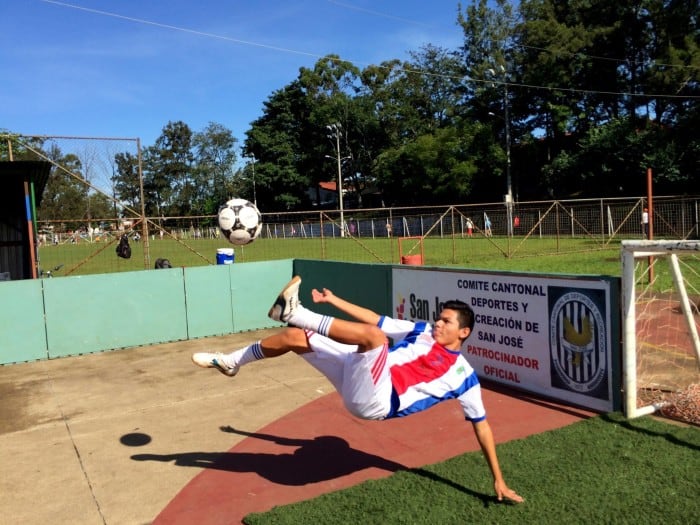It may look small with just four players on each team defending shrunken goals on pint-sized fields, but the impact that organized street football has on the world’s homeless populations is anything but tiny.
In trying to empower its less fortunate citizens through football, Costa Rica’s Listening to the Homeless Association will bring an eight-person roster to the Homeless World Cup in Amsterdam next month to compete against 47 other countries.
José Luis Monge Fernández founded the association in 2008 and has taken a team to the World Cup every year since. In that span, he’s been able to take rehabilitating drug addicts and impoverished immigrants from Costa Rica to places like Italy, Poland, Brazil, and Chile.
“It’s a struggle but it’s one that you have to keep fighting,” Monge said. “When I started they called me crazy, but we’ve had some success and now I’m even coming out with a book.”
The new book entitled “Del Cartón al Avión,” or “From the Cardboard Box to the Airplane,” details Monge’s seven-year journey of showing homeless Costa Ricans the world through football and the many roadblocks along the way.
The Costa Rican Institute of Sports and Recreation (ICODER) funds the money for plane tickets to the World Cup and other events like the Street Football American Cup, which Costa Rica won in 2012. But in terms of food, housing, and equipment, the association is largely on its own. Monge said they get no private sponsorship and have minimal capital to spend on basic amenities.
However, the Homeless World Cup Organization, which has hosted the charity tournament since it began in 2003, pays to feed and house the athletes for the entirety of the week-long event.
“When a homeless person gets involved in football, they build relationships and become teammates who learn to trust and share,” the organization writes on its web site. “They have a responsibility to attend training sessions and games, to be on time, and to be prepared to participate. They feel that they are part of something larger than themselves.”
In order to qualify for the Homeless World Cup’s rosters, a player must meet at least one of the following criteria: Has been homeless at some point after September, 2014; Enrolled in drug or alcohol rehabilitation center; Homeless immigrant without positive asylum status; Receiving his/her main income working as street paper vendor.
Players must also be more than 16 years of age, according to World Cup rules. Monge said his players range in age from 20 to 35 years old.
In addition, no athlete is eligible if he or she played in a previous World Cup. Each participating country can have a mixed roster of men and women, but it must have two teams of four players each: one goalie and three players in the field.
Monge said the Listening to Homeless Association starts each year with a 16-person roster before designating eight who will travel to the tournament. The other half is placed in workshops and rehab clinics, he said.
The Municipality of San José estimates that around 1,800 people in Chepe are homeless.
Costa Rica is listed in Group C alongside five other teams, including Italy and Canada. The World Cup runs Sept. 12-19.






